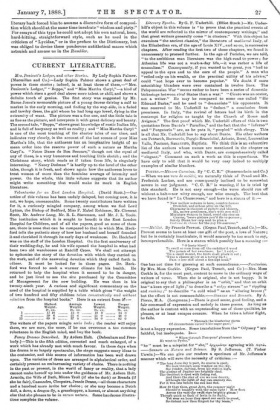Literary Epochs. By G. F. Underhill. (Elliot Stook.)—Mr. Under- hill's
object in this volume is "tic prove that the practical events of the world are reflected in the mirror of contemporary writings," and that great writers generally come "in clusters." With this object he examines "the ancient classics," the literature of mediaeval Italy, of the Elizabethan era, of the age of Louis XIV., and so on, in successive chapters. After reading the first two of these chapters, we found it unnecessary to proceed farther. In the age of Pericles, we are told, "to the ambitious man literature was the high.road to power ; for Athenian life was not a work-a-day life,—it was rather a life of sensualism." Consequently, if you wanted to be great, you "had to appeal to the eyes and to the ears of the people." A man who "relied only on his wealth, or the practical utility of his advice," could "not hope ever to become popular." We doubt if more astonishing blunders were ever contained in twelve lines. The Peloponnesian War "seems rather to have been a series of domestic bickerings between rival States than a war." "Cicero was an orator, not a writer." He May be compared to some one called "Sir Edmund Burke," and he used to " denunciate " his opponents. It was reserved to Mr. Underhill to " deduct " a conclusion from promisees. In Italy, "the revival of letters had its birth in the contempt for religion as taught by the Church of Rome and Avignon." The first proof which Mr. Underhill offers of this is two quotations from Dante's "Paradise," and the fact that the "Inferno" and " Purgatorio " are, as he puts it, " peopled " with cleigy. This is all that Mr. Underhill has to say about Dante. His other authors are Petrarch, Boccaccio, Poggio Bracciolini, Ariosto, Berni, Laurentins Valla, Pontano, Sanazzaro, Baptista. We think this is an exhaustive list of the authors whose names are mentioned in the chapter on mediawal Italy, and who, with Dante, are comprehensively called "elegant." Comment on such a work as this is superfluous. We have only to add that it would be very easy indeed to multiply examples of similar blunders.






















































 Previous page
Previous page